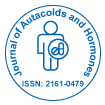Review Article
Reviews: Serum Anticholinergic Activity: A Biomarker for Rapid Progression of Alzheimer's Disease
| Koji Hori1*, Kimiko Konishi1,2, Hiroi Tomioka1, Masayuku Tani3, Genshin Minegishi4, Hiroaki Tanaka4, Ryo Akita1, Sachiko Yokoyama1, Tomonori Oshio1 and Mitsugu Hachisu5 | ||
| 1Department of Psychiatry, Showa University Northern Yokohama Hospital, Kanagawa, Japan | ||
| 2Tokyo Metropolitan Tobu Medical Center for Persons with Developmental/ Multiple Disabilities, Tokyo, Japan | ||
| 3Department of Psychiatry, Showa University Karasuyama Hospital, Tokyo, Japan | ||
| 4Department of Psychiatry, Showa University Fujigaoka Hospital, Kanagawa, Japan | ||
| 5Department of Clinical Psychopharmacy, School of Pharmaceutical Sciences, Showa University, Tokyo, Japan | ||
| Corresponding Author : | Koji Hori Department of Psychiatry Showa University Northern Yokohama Hospital 35-1 Chigasakichuo, Tsuzukiku Yokohama-City, Kanagawa 224-8503, Japan Tel: +81-45-949-7000 Fax: +81-45-949-7927 E-mail: kojihori@med.showa-u.ac.jp |
|
| Received October 28, 2011; Accepted February 27, 2012; Published March 01, 2012 | ||
| Citation: Hori K, Konishi K, Tomioka H, Tani M, Minegishi G (2012) Reviews: Serum Anticholinergic Activity: A Biomarker for Rapid Progression of Alzheimer’s Disease. Autacoids S4:001. doi: 10.4172/2161-0479.S4-001 | ||
| Copyright: © 2012 Hori K, et al. This is an open-access article distributed under the terms of the Creative Commons Attribution License, which permits unrestricted use, distribution, and reproduction in any medium, provided the original author and source are credited. | ||
Related article at Pubmed Pubmed  |
||
Abstract
We have previously reported the possibilities that anticholinergic activity (AA) appeared endogenously in Alzheimer’s disease (AD) and accelerated AD pathology. In this article we reviewed the reasons why AA endogenously appeared in AD and accelerated AD pathology and that the serum anticholinergic activity (SAA) was suitable as one of the biological marker of AD. We argued firstly that an acethycholine (Ach) played a role to maintain an endogenous anti-inflammatory pathway in the brain and the peripheral tissue. Secondarily, the deficiency of Ach in the brain might trigger the inflammatory process in AD patients by way of the suppression of cholinergic anti-inflammatory pathway and AA might be generated by inflammatory process. At third, AA disturbed not only memory functions but also accelerated AD pathology (increasing of amyloidgenic), and at fourth, we proposed a possibility that the SAA was useful as a marker of rapid progression of AD pathology in the moderate stage. SAA was considered to appear at moderate stage of AD when the symptoms rapidly were progress and an inflammation was occurred in the brain. The activities of N-methyl-D-aspartate (NMDA) receptors were accelerated and it progressed an inflammation in the brain. Memantine should be prescribed to AD patients with positive SAA in order to suppress inflammation by antagonizing the NMDA receptor. Therefore, when SAA was detected in AD, it should be considered to prescribe memantine. Finally, we speculated that down regulation of Ach and up regulation of NMDA receptor were involved in the pathology (increasing of amyloid) of AD disease and commented that cholinesterase inhibitors in mild stage and NMDA receptor antagonist in moderate stage in AD should be prescribed to prevent appearance of AA as well as to ameliorate symptoms by way of the up-regulation of Ach and the suppression of inflammation process.
